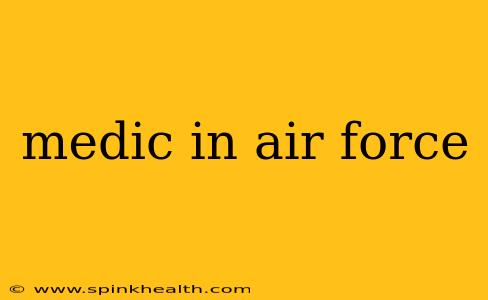The roar of the engines, the rush of adrenaline, the unwavering commitment to service – these are just a few elements that define the life of an Air Force medic. But it's far more than just a job; it's a calling, a dedication to providing critical medical care in dynamic and often challenging environments. This isn't your average hospital setting; it's a world where adaptability, resilience, and a profound sense of duty are paramount.
My journey into understanding the role of an Air Force medic began with a conversation with a veteran, a seasoned flight medic who shared stories of his time serving. His experiences painted a vivid picture, one that moved beyond the sterile descriptions found in official documentation. It's a world where the line between peacetime training and responding to emergencies blurs, and where the skills honed during rigorous training are put to the ultimate test.
What Does an Air Force Medic Do?
Air Force medics, encompassing various specialties, aren't simply patching up minor injuries. Their roles are multifaceted and crucial, covering a broad spectrum of medical needs. From providing primary care to managing critical injuries sustained during flight operations or deployments, their skills are essential for maintaining the health and readiness of personnel.
They are the frontline medical professionals, responsible for:
- Providing routine medical care: This includes preventative medicine, administering vaccinations, and conducting health screenings.
- Responding to emergencies: This ranges from on-base incidents to complex medical scenarios during deployments or airlift missions. This requires swift, decisive action under pressure.
- Managing trauma: Air Force medics are extensively trained in trauma care, equipped to handle a wide variety of injuries, from broken bones to life-threatening wounds.
- Providing aeromedical evacuation: This involves the safe and efficient transportation of patients, often requiring specialized skills and knowledge in managing patients in flight.
What are the Different Specialties for Air Force Medics?
The Air Force offers diverse medical specialties, providing opportunities for medics to specialize in their area of interest and expertise. Here are a few of the common specialties:
-
Critical Care Air Transport Teams (CCATT): These highly trained professionals specialize in providing advanced life support during aeromedical evacuations. They manage critically ill or injured patients while in transit, ensuring their safety and stability.
-
Flight Nurses: Working alongside flight doctors and other medical personnel, flight nurses provide comprehensive nursing care during flight operations.
What Kind of Training Do Air Force Medics Receive?
Becoming an Air Force medic requires rigorous training and a dedication to excellence. The process is intensive, demanding both physical and mental stamina. The curriculum covers a wide range of medical procedures and techniques, preparing medics for the challenges they may face.
Formal Training: This includes basic and advanced medical training, often exceeding the requirements of civilian counterparts.
On-the-job Training: Practical experience in various settings, including deployments and airlift operations, solidifies their skills and enhances their adaptability.
What are the Requirements to Become an Air Force Medic?
Aspiring Air Force medics must meet specific requirements, emphasizing physical fitness, academic achievements, and a commitment to service. These include:
- Passing the ASVAB (Armed Services Vocational Aptitude Battery): This test assesses aptitude in various areas, including medical knowledge.
- Meeting the physical fitness standards: Air Force medics must be physically fit to handle the demands of their job.
- Completing required education: A high school diploma or GED is usually the minimum requirement, though further education may be advantageous.
What are the Career Progression Opportunities for Air Force Medics?
The Air Force offers various career progression opportunities for medics, allowing them to advance their skills and take on greater responsibilities.
- Specialty training: The opportunity to specialize in areas like critical care or flight nursing.
- Leadership roles: Medics can progress into leadership positions, managing teams and overseeing medical operations.
- Civilian opportunities: The skills and experience gained as an Air Force medic are highly valued in the civilian medical field.
How Much Does an Air Force Medic Make?
The salary of an Air Force medic depends on rank and years of service. It's comparable to other military medical professionals and includes benefits like health insurance and retirement plans.
The life of an Air Force medic is one of challenge, commitment, and profound reward. It's a career path for those seeking a meaningful life of service, providing essential medical care in a dynamic and ever-changing environment. While the path is demanding, the sense of purpose and the contributions made are immeasurable.

